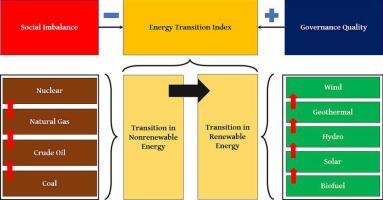Energy Economics ( IF 12.8 ) Pub Date : 2023-03-21 , DOI: 10.1016/j.eneco.2023.106642 Avik Sinha , Stelios Bekiros , Nazim Hussain , Duc Khuong Nguyen , Sana Akbar Khan

|
In line with the COP26 Summit objectives, this paper develops a policy framework to achieve energy transition by considering the social imbalances and regulatory effectiveness. A new energy transition index is proposed. It is an output-side indicator based on the energy ladder hypothesis. This index enables to apprehend the energy transition scenario in any country by capturing (a) the transition to a cleaner energy source, and (b) the transition to more energy efficient sources. Using the two-step System GMM approach and data for 37 OECD countries over the 2000–2019 period, the dynamic and extreme marginal impacts of energy transition drivers with respect to estimates of the model parameters are analyzed. The results show that the social imbalance dampens the positive impacts of energy transition drivers, whereas governance quality helps in augmenting those impacts. The outcomes, drawn from a scenario-based policy design approach, are particularly helpful in advancing potential policy discourse. They have important practical implications for the development of the SDG-oriented policy framework, with special focus on the attainment of the SDG 7 and 13.
中文翻译:

社会失衡和治理质量如何影响经合组织国家能源转型的政策指令?
根据 COP26 峰会的目标,本文制定了一个政策框架,通过考虑社会失衡和监管有效性来实现能源转型。提出了新的能源转型指数。它是基于能量阶梯假说的输出侧指标。该指数能够通过捕获 (a) 向更清洁能源的过渡,以及 (b) 向更节能来源的过渡来了解任何国家的能源转型情景。使用两步系统 GMM 方法和 2000-2019 年期间 37 个经合组织国家的数据,分析了能源转型驱动因素对模型参数估计的动态和极端边际影响。结果表明,社会失衡抑制了能源转型驱动因素的积极影响,而治理质量有助于增强这些影响。从基于场景的政策设计方法中得出的结果特别有助于推进潜在的政策讨论。它们对制定以可持续发展目标为导向的政策框架具有重要的实际意义,特别侧重于实现可持续发展目标 7 和 13。


























 京公网安备 11010802027423号
京公网安备 11010802027423号